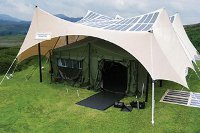
Most people in the renewable energy market are figuring that out.
But there is something that they haven't yet figured out. Depending on utilities as change agents is a sucker's game.
I know that's true from my career covering the Bells. I've learned it's not that they want to be stupid. They just have so many layers of management, who are so necessarily risk-averse, that they can't move quickly. They may appear to do so, when huge opportunities are presented, and when their self-interest is at stake, but such speed is relative. You're still looking at a turtle.
I have told the story of Dennis Hayes many times now, and it's sad to see history repeat itself in the person of Jesse Berst (above). Back in the 1990s I (like many of my colleagues in the computer press) had a severe case of Berst envy. He ran ZDNet Anchordesk, with a 3 million name mailing list.
Then he seemed to disappear off the face of the Earth. Turned out he had gotten turned on by the smart grid and renewable energy, as I would be later. He now runs a news site and discussion forums on the topic, he consults and sits on boards, and these days when entrepreneurs have a choice between sitting in on him or Al Gore at an industry conference, they're going Berst.

But waiting on the utilities to make the first move is a fool's errand. Utilities don't roll that way. (Picture from the US Army.)
What the history of the last 40 years tells me is that you deliver them a fait accompli, a complete design with a business model, an offer they can't refuse. The government spent 20 years funding what became the Internet, funded it for the same reason we fought in Vietnam. It was a Cold War activity.
We need the same sort of urgency here. Blame Osama bin Laden. Our electrical system can be taken down far too easily today. Put the grid into the national security budget. Call if toilet seats if you have to. Make every base energy self-sufficient. Design systems for them which collect as well as disburse power, that are flexible and intelligent. Experiment. Then deliver those solutions to the market through standards bodies.
What the industry needs to do most, I think, is scale demand on the consumer side. There are good solutions out there, for when you're off the grid, at power ratings up to 2 kilowatts. There's no reason your scout troop needs to go off to Lake Kilamawaukee and not have its gadgets. There's no reason why things like Christmas lights or laptops should have to be plugged-in. There's no real reason for Africa to be dark any more.
There's also a lot of money to be made in efficiency, right now, adding chips to electrical plugs so they don't leak power from the house when devices are turned off. And there are both gadget freaks and leading-edge consumers who are very interested in solar panels and windmills and power storage solutions. There are building owners who not only want to make what they rent tighter, but want to exploit their walls and rooftops. We can draw power out of our roads, soon, so every highway department can sell power as well. Yes, you're at the front of the s-curve right now, but that's how markets start.
And it's markets we need in renewable energy. Not government, not utilities. Markets. These will develop. These are developing. Right now these are niche markets, but the capabilities of solar are doubling nearly every year, prices are constantly under pressure, there is demand, and it's there where attention should be put — not on utilities.
Sorry, Jesse.









